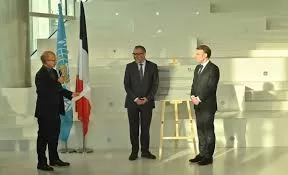Lyon, France — In a landmark event, the World Health Organization (WHO) Academy officially opened its doors yesterday with a high-profile inauguration ceremony attended by French President Emmanuel Macron, WHO Director-General Dr. Tedros Adhanom Ghebreyesus, and global health leaders. The event marks the launch of a groundbreaking initiative aimed at addressing critical gaps in the global health workforce and advancing health equity worldwide.
President Macron expressed pride in France’s role in hosting the Academy, stating, “This new global institution in Lyon will bring the best in health training and innovation to the world. With cutting-edge technologies and AI, we aim to make healthcare more accessible globally. Better-trained health workers are crucial for a safer world, particularly in preventing and responding to future pandemics.”
Dr. Tedros hailed the Academy as a transformative venture for global health education, emphasizing its potential to bridge the gap between WHO’s technical guidelines and their practical implementation. “The WHO Academy will equip health and care workers, policymakers, and our global workforce with the skills needed to transform health systems and deliver health for all,” he said.
A Global Response to a Global Challenge
The WHO Academy is designed to tackle one of the most pressing challenges in global health: the shortage of healthcare workers. With a projected shortfall of 10 million health and care workers by 2030, particularly in low- and middle-income countries, the Academy aims to be a vital resource in strengthening health systems.
Leveraging partnerships with leading academic and research institutions worldwide, the Academy will offer both in-person and online training programs. Its state-of-the-art campus in Lyon spans 11,000 square meters and features 22 training rooms, a simulation center, a modern auditorium, and a cutting-edge online learning platform.
The Academy’s digital platform democratizes access to education, offering free courses on priority health topics. This ensures that healthcare professionals, regardless of their location, can access world-class training to improve their skills and knowledge.
Ambitious Goals for Global Impact
The WHO Academy plans to train 3 million healthcare workers by 2028, including nurses, clinicians, midwives, senior decision-makers, and public health managers. By producing 50 to 80 new courses annually, it aims to deliver approximately 260 courses by the end of the decade.
The Academy’s programs will focus on equipping professionals with skills in cutting-edge areas such as artificial intelligence, research and development, and health system management. These efforts will help close the gap in healthcare access and enhance the delivery of essential services, including immunization, maternal care, and treatment for communicable diseases.
A Vision for the Future
Launched seven years ago, the WHO Academy represents a collaborative effort supported by the French government, the Auvergne-Rhône-Alpes region, Lyon City and Métropole, and other global partners. It embodies a shared vision of a world where healthcare is universally accessible, and health systems are resilient and effective.
“This Academy is a bold step forward,” said Dr. Tedros. “It will not only strengthen health systems but also empower professionals worldwide to create a healthier, safer, and fairer future for all.”
As the WHO Academy begins its journey, it holds the promise of transforming global health through education, innovation, and collaboration—an endeavor that could redefine how the world addresses its most pressing health challenges.












